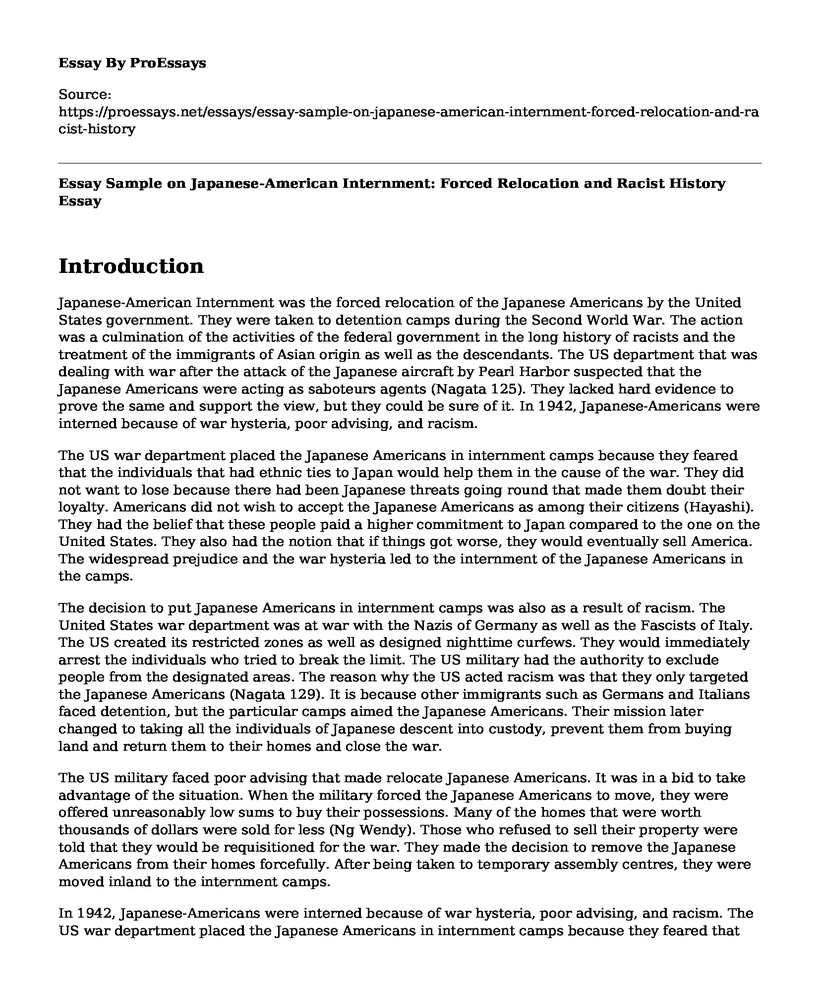Introduction
Japanese-American Internment was the forced relocation of the Japanese Americans by the United States government. They were taken to detention camps during the Second World War. The action was a culmination of the activities of the federal government in the long history of racists and the treatment of the immigrants of Asian origin as well as the descendants. The US department that was dealing with war after the attack of the Japanese aircraft by Pearl Harbor suspected that the Japanese Americans were acting as saboteurs agents (Nagata 125). They lacked hard evidence to prove the same and support the view, but they could be sure of it. In 1942, Japanese-Americans were interned because of war hysteria, poor advising, and racism.
The US war department placed the Japanese Americans in internment camps because they feared that the individuals that had ethnic ties to Japan would help them in the cause of the war. They did not want to lose because there had been Japanese threats going round that made them doubt their loyalty. Americans did not wish to accept the Japanese Americans as among their citizens (Hayashi). They had the belief that these people paid a higher commitment to Japan compared to the one on the United States. They also had the notion that if things got worse, they would eventually sell America. The widespread prejudice and the war hysteria led to the internment of the Japanese Americans in the camps.
The decision to put Japanese Americans in internment camps was also as a result of racism. The United States war department was at war with the Nazis of Germany as well as the Fascists of Italy. The US created its restricted zones as well as designed nighttime curfews. They would immediately arrest the individuals who tried to break the limit. The US military had the authority to exclude people from the designated areas. The reason why the US acted racism was that they only targeted the Japanese Americans (Nagata 129). It is because other immigrants such as Germans and Italians faced detention, but the particular camps aimed the Japanese Americans. Their mission later changed to taking all the individuals of Japanese descent into custody, prevent them from buying land and return them to their homes and close the war.
The US military faced poor advising that made relocate Japanese Americans. It was in a bid to take advantage of the situation. When the military forced the Japanese Americans to move, they were offered unreasonably low sums to buy their possessions. Many of the homes that were worth thousands of dollars were sold for less (Ng Wendy). Those who refused to sell their property were told that they would be requisitioned for the war. They made the decision to remove the Japanese Americans from their homes forcefully. After being taken to temporary assembly centres, they were moved inland to the internment camps.
In 1942, Japanese-Americans were interned because of war hysteria, poor advising, and racism. The US war department placed the Japanese Americans in internment camps because they feared that the individuals that had ethnic ties to Japan would help them in the cause of the war. The US military faced poor advising that made relocate Japanese Americans. The US military faced poor advising that made relocate Japanese Americans.
Works Cited
Hayashi, Brian Masaru. Democratizing the enemy: the Japanese American internment. Princeton University Press, 2010.
Nagata, Donna K. "Intergenerational effects of the Japanese American internment." International handbook of multigenerational legacies of trauma. Springer, Boston, MA, 1998. 125-139.
Ng, Wendy L. Japanese American internment during World War II: A history and reference guide. Greenwood Publishing Group, 2002.
Cite this page
Essay Sample on Japanese-American Internment: Forced Relocation and Racist History. (2023, Apr 04). Retrieved from https://proessays.net/essays/essay-sample-on-japanese-american-internment-forced-relocation-and-racist-history
If you are the original author of this essay and no longer wish to have it published on the ProEssays website, please click below to request its removal:
- Trade Openness
- Paper Example on Factors That Affect the Exportation of Foodstuff
- NAFTA Trade Agreement Essay Example
- Essay on Trade Blocs: Benefits & Examples of International Trade Agreements
- Essay Example on European Entry Leads to Sweeping Changes in 9th Century Indian Ocean
- Essay Example on NAFTA: Uniting Three Countries Through Free Trade
- Navigating the Uncertainties of Global Trade Tariffs: Challenges, Risks, and Strategies - Free Report







